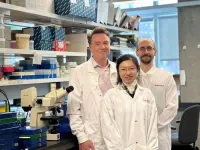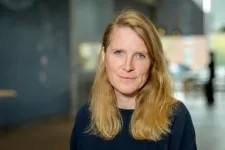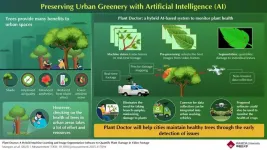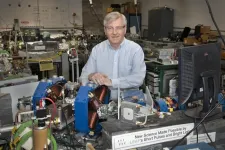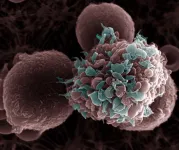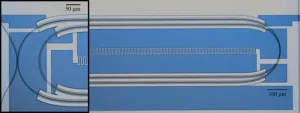(Press-News.org) NEW YORK—Thirty-two early career researchers, tackling issues from improving food security to developing better medical implants, were awarded up to two years of grant funding to pursue innovative interdisciplinary science, Schmidt Science Fellows announced today.
Now in its eighth year, the fellowship, a program of Schmidt Sciences, provides financial support for a postdoctoral placement of one to two years at a world-class research institution. The funding equips scientists to apply their knowledge to a new field of study with the goal of accelerating discoveries.
“Philanthropic funding of scientific research, and especially support of early-career researchers, has never been more important,” said Wendy Schmidt, who co-founded Schmidt Sciences with her husband, Eric. “By providing Schmidt Science Fellows with support, community, and freedom to work across disciplines and gain new insights, we hope they'll tackle some of the world's most vexing challenges, achieve breakthroughs and help create a healthier, more resilient world for all.”
The 2025 fellows represent 15 nationalities, including researchers from Jordan and United Arab Emirates for the first time in the program’s history. This year’s cohort will work on a range of problems from cancer treatment to quantum technologies to sustainability. For example, Zhaoquan Wang (nominated by Cornell University) will pivot from immunology to evolutionary biology and explore advanced cognitive and regenerative capabilities of the octopus, pioneering cutting-edge biomedical research. Noora Almarri (nominated by University College London) will turn from electrical engineering to biomaterials with an aim of developing smart artificial blood vessels that enhance regrowth and provide real-time health monitoring. They join a community of 209 fellows from nearly 40 countries who are leaders in interdisciplinary science.
“Our fellows represent the next generation of visionary research leaders,” said Megan Kenna, executive director of Schmidt Science Fellows. “Through their work, they will break down barriers, drive interdisciplinary breakthroughs, and push the frontiers of human knowledge. Our fellowship is designed to empower their growth—now and in the years ahead. Through tailored training, mentorship, and a dynamic community, we provide the support and environment they need to realize their full potential and make a lasting impact.”
Each year, Schmidt Science Fellows works in partnership with more than 100 universities to identify candidates for the fellowship. Nominees are selected via an application process that includes an academic review with panels of experts in their original disciplines and final interviews with a multidisciplinary panel of scientists and private sector leaders. Established in 2017, the program is delivered in partnership with the Rhodes Trust.
"The Schmidt Science Fellows Program is cultivating a dynamic global community of remarkable scientists and champions of interdisciplinary research,” said Stu Feldman, chief scientist at Schmidt Sciences. “Their work exemplifies Schmidt Sciences commitment to support pioneering approaches that will drive the next era of discovery and innovation."
The 2025 Schmidt Science Fellows represent 27 nominating universities, including, for the first time, McGill University in Canada, RWTH Aachen University in Germany, Tecnológico de Monterrey in Mexico, University of California, Los Angeles, and University of Groningen in the Netherlands. Alongside their research placement, fellows participate in a 12-month interdisciplinary science leadership program.
As part of the broader mission of supporting interdisciplinary science, Schmidt Science Fellows partnered with Times Higher Education to create the Interdisciplinary Science Rankings, which identifies and promotes best practices from institutions prioritizing cross-disciplinary research. The inaugural edition of the ranking was released in November 2024. This year’s list will be shared in fall 2025.
Meet the 2025 Fellows and explore their groundbreaking research.
Discover the work of our Senior Fellows, those awarded Fellowships in previous years, in this compelling series of profile films.
About Schmidt Science Fellows:
Schmidt Science Fellows is an initiative of Schmidt Sciences, delivered in partnership
with the Rhodes Trust. Working with the scientific community, the organization breaks down barriers to interdisciplinary science and accelerates positive impacts for global society. It helps scientists solve bigger problems faster by identifying, developing, and amplifying the next generation of science leaders, building a community of scientists and supporters of interdisciplinary science, and leveraging this network to drive sector-wide change.
About Schmidt Sciences:
Schmidt Sciences is a nonprofit organization founded in 2024 by Eric and Wendy Schmidt that works to accelerate scientific knowledge and breakthroughs with the most promising, advanced tools to support a thriving planet. The organization prioritizes research in areas poised for impact including AI and advanced computing, astrophysics, biosciences, climate, and space—as well as supporting researchers in a variety of disciplines through its science systems program.
Media Contacts:
Chris Buratta, Communications Manager, Schmidt Science Fellows
cburatta@schmidtsciencefellows.org
Carlie Wiener, Ph.D., Director of Communications, Schmidt Sciences
cwiener@schmidtsciences.org
END
From octopus intelligence to smart artificial blood vessels: 2025 Schmidt Science Fellows to break new ground with interdisciplinary research
Scientists to receive up to two years of funding from Eric and Wendy Schmidt
2025-04-02
ELSE PRESS RELEASES FROM THIS DATE:
Experts challenge aspirin guidelines based on their undue reliance on a flawed trial
2025-04-02
Recent guidelines have restricted aspirin use in the primary prevention of cardiovascular disease. The American Heart Association (AHA)/American College of Cardiology (ACC) guidelines restricted aspirin to patients under 70, and more recently, the United States Preventive Services Task Force restricted aspirin use to patients under 60. However, heart attack and stroke risks both rise with age, leaving health care providers unsure about when to stop prescribing aspirin, whether it should be used for primary prevention, and which patients would benefit most.
Researchers from Florida Atlantic University’s ...
McGill discovery sheds new light on autism, intellectual disabilities
2025-04-02
A new study by McGill University researchers yields insights into how the disruption of calcium transport in the brain is linked to autism and intellectual disability. The findings, published in the journal Nature, not only upend a long-held belief among neuroscientists, but could pave the way for treatments.
The researchers discovered that tiny protein structures on brain cells, known as AMPA receptors, can transport calcium. While previous research had suggested that disruptions in calcium ...
Cellular changes occur even below the hexavalent chromium limit
2025-04-02
In Sweden, around 18,000 workers are exposed to hexavalent chromium in their workplace. Hexavalent chromium is a powerful carcinogen that is released, for example, during welding of stainless steel or the manufacture of paints and rustproofing.
Thirty years ago, the limit for hexavalent chromium in Sweden was set at 5 micrograms per cubic metre of air. It is a technically calculated value that was determined based on what industry was considered to be able to handle at the time, rather than medical studies examining the level at which people start developing ...
Study suggests a new way to curb social media’s body image toll
2025-04-02
PULLMAN, Wash. — Reflecting on how fitness posts on social media make them feel may help young women reduce the harmful tendency to compare themselves to idealized influencers and content online.
That’s according to a new study published in Health Communication that explores the impact of “fitspiration”—fitness-themed inspirational content—on young women’s body image, and whether short, daily reflections could lead to meaningful changes in their emotions and self-perception.
Led by Jessica Willoughby, associate professor of communication at Washington State University, the research found that sending young women twice-daily ...
Plant doctor: An AI system that watches over urban trees without touching a leaf
2025-04-02
Urban trees and plants do more than just beautify city landscapes. They purify the air, reduce urban heat islands, provide recreational spaces, and even boost property values. As essential components of sustainable urban ecosystems, plants silently contribute to our well-being. However, urban trees face many threats, including pests, diseases, and climate change, making it essential to keep their health in check.
Urban greenery monitoring has traditionally been a very labor-intensive process, requiring botanical expertise and considerable resources. With cities expanding ...
Study tracks chromium chemistry in irradiated molten salts
2025-04-02
UPTON, N.Y. — High temperatures and ionizing radiation create extremely corrosive environments inside a nuclear reactor. To design long-lasting reactors, scientists must understand how radiation-induced chemical reactions impact structural materials. Chemists at the U.S. Department of Energy’s (DOE) Brookhaven National Laboratory and Idaho National Laboratory recently performed experiments showing that radiation-induced reactions may help mitigate the corrosion of reactor metals in a new type of reactor cooled by molten salts. Their findings are published in the journal Physical ...
Scientists: the beautiful game is a silver bullet for global health
2025-04-02
Danish researchers, in collaboration with the Danish Football Association, have released a White Paper that describes football as an effective recipe in the prevention and treatment of lifestyle-related diseases.
The White Paper entitled Football as Prevention and Treatment - A White Paper Focusing on 10 Non-Communicable Diseases and Risk Factors – compiles and presents research and practical experience from over 20 years of implementing recreational football training in Denmark and several other countries.
The authors also provide best practice ...
Being physically active, even just a couple of days a week, may be key to better health
2025-04-02
Research Highlights:
New research suggests that participating in at least 150 minutes of moderate to vigorous physical activity in just two days had similar health benefits as distributing the activity throughout the week.
People who followed the “weekend warrior” approach, condensing physical activity into one or two days each week, had a significantly lower risk of death from all causes, cardiovascular disease and cancer, similar to those who engaged in activity throughout the week.
The study ...
High-fat diet promote breast cancer metastasis in animal models
2025-04-02
CNIO researchers discover that, in mice that eat a lot of fat, cancer cells travelling through the blood surround themselves with platelets, which act as an armor-like protection as they spread.
In addition, in animals with a fatty diet it is easier for tumor cells to 'nest' in other organs and give rise to metastasis of the primary tumor.
“These results anticipate a future in which dietary changes, together with the control of platelet activity, will complement antitumor treatments,” says Héctor Peinado, of the Spanish National Cancer Research Center (CNIO).
The study is published ...
A router for photons
2025-04-02
Applied physicists at the Harvard John A. Paulson School of Engineering and Applied Sciences (SEAS) have created a photon router that could plug into quantum networks to create robust optical interfaces for noise-sensitive microwave quantum computers.
The breakthrough is a crucial step toward someday realizing modular, distributed quantum computing networks that leverage existing telecommunications infrastructure. Comprising millions of miles of optical fiber, today’s fiber-optic networks send information between computing clusters as pulses ...
LAST 30 PRESS RELEASES:
SfN announces Early Career Policy Ambassadors Class of 2026
Spiritual practices strongly associated with reduced risk for hazardous alcohol and drug use
Novel vaccine protects against C. diff disease and recurrence
An “electrical” circadian clock balances growth between shoots and roots
Largest study of rare skin cancer in Mexican patients shows its more complex than previously thought
Colonists dredged away Sydney’s natural oyster reefs. Now science knows how best to restore them.
Joint and independent associations of gestational diabetes and depression with childhood obesity
Spirituality and harmful or hazardous alcohol and other drug use
New plastic material could solve energy storage challenge, researchers report
Mapping protein production in brain cells yields new insights for brain disease
Exposing a hidden anchor for HIV replication
Can Europe be climate-neutral by 2050? New monitor tracks the pace of the energy transition
Major heart attack study reveals ‘survival paradox’: Frail men at higher risk of death than women despite better treatment
Medicare patients get different stroke care depending on plan, analysis reveals
Polyploidy-induced senescence may drive aging, tissue repair, and cancer risk
Study shows that treating patients with lifestyle medicine may help reduce clinician burnout
Experimental and numerical framework for acoustic streaming prediction in mid-air phased arrays
Ancestral motif enables broad DNA binding by NIN, a master regulator of rhizobial symbiosis
Macrophage immune cells need constant reminders to retain memories of prior infections
Ultra-endurance running may accelerate aging and breakdown of red blood cells
Ancient mind-body practice proven to lower blood pressure in clinical trial
SwRI to create advanced Product Lifecycle Management system for the Air Force
Natural selection operates on multiple levels, comprehensive review of scientific studies shows
Developing a national research program on liquid metals for fusion
AI-powered ECG could help guide lifelong heart monitoring for patients with repaired tetralogy of fallot
Global shark bites return to average in 2025, with a smaller proportion in the United States
Millions are unaware of heart risks that don’t start in the heart
What freezing plants in blocks of ice can tell us about the future of Svalbard’s plant communities
A new vascularized tissueoid-on-a-chip model for liver regeneration and transplant rejection
Augmented reality menus may help restaurants attract more customers, improve brand perceptions
[Press-News.org] From octopus intelligence to smart artificial blood vessels: 2025 Schmidt Science Fellows to break new ground with interdisciplinary researchScientists to receive up to two years of funding from Eric and Wendy Schmidt


